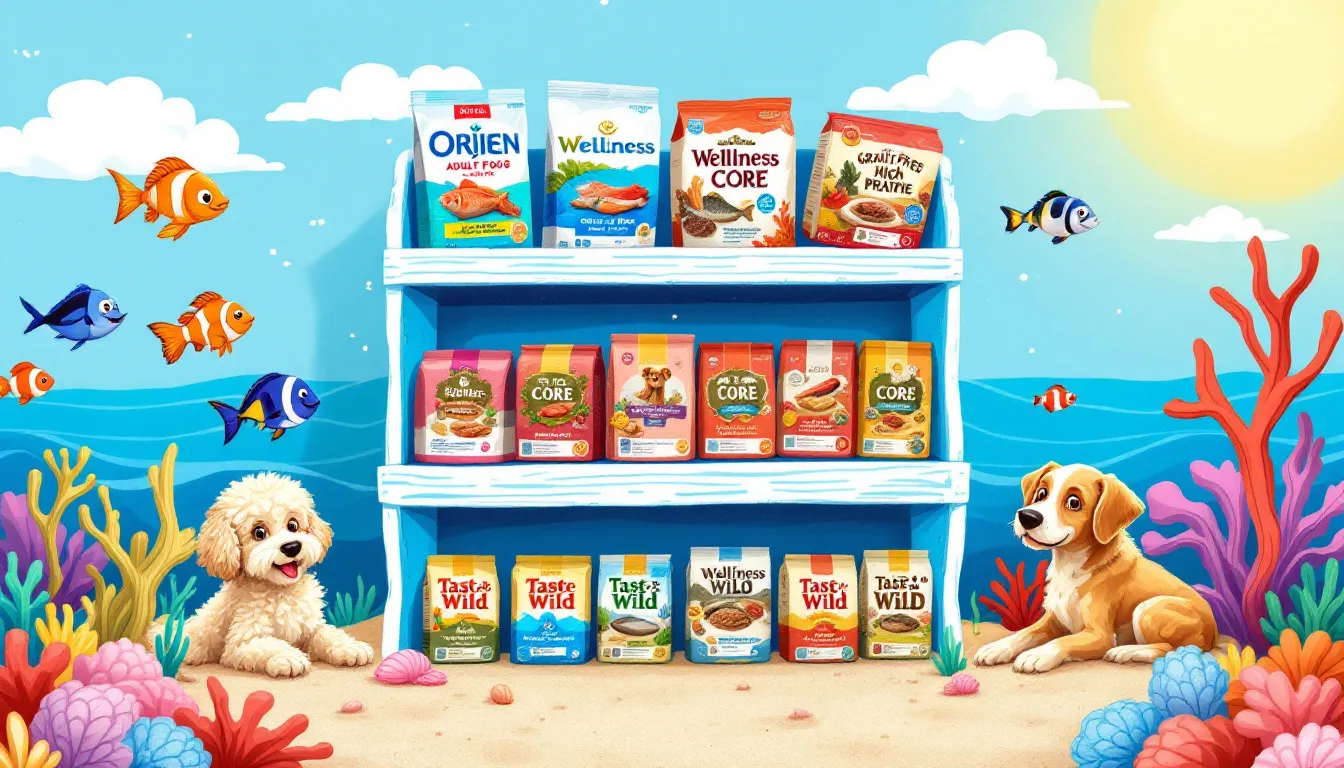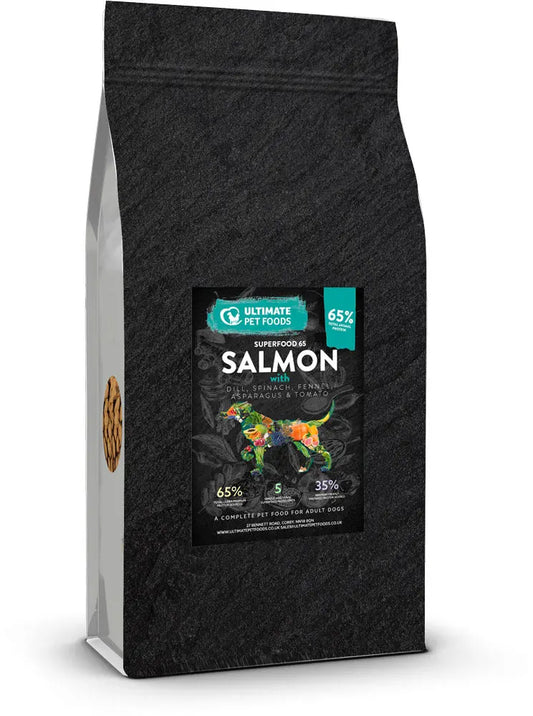The Best Fish Dog Food: Healthy Choices for Your Canine Companion
Top Benefits of Fish Dog Food for Your Pet's Health
Is fish dog food a good choice for your pet? Fish-based diets are rich in omega-3 fatty acids, support heart health, and can be great for dogs with allergies. This article breaks down the key benefits of incorporating fish into your dog’s diet.
Key Takeaways
-
Fish-based dog food with sweet potato provides essential omega-3 fatty acids that support joint health, cognitive function, and heart health in dogs.
-
High protein content in fish promotes muscle development and overall energy, making it an ideal choice for active dogs.
-
Including essential vitamins, minerals, and trace elements in fish dog food ensures a balanced diet that promotes skin, coat health, and overall vitality.
-
See our complete range of fish based dog food, which are all grain free.
Health Benefits of Fish-Based Dog Food With Sweet Potato
Fish-based dog food offers significant health advantages for dogs, much like it does for humans. Including fish in your dog’s diet can support heart health, provide vital nutrients, and contribute to overall well-being. The rich omega-3 fatty acids found in fish are particularly beneficial, supporting cognitive function and alleviating joint discomfort. For dogs with allergies or sensitivities to common proteins like chicken or beef, fish protein serves as an excellent alternative, ensuring they receive all the nutrients they need without adverse reactions.
Moreover, dehydrated fish treats can be an enjoyable and nutritious addition to your dog’s diet. These treats not only add variety but also help maintain dental health by reducing plaque and tartar.
Let’s explore the specific health benefits of omega-3 fatty acids, high protein content, and improved skin and coat health.
Omega-3 Fatty Acids
EPA (Eicosapentaenoic Acid) and DHA (Docosahexaenoic Acid), omega-3 fatty acids found in fish, are crucial for a healthy dog diet. These fatty acids play a crucial role in promoting cognitive function and joint health in dogs. As our canine companions age, they may experience joint issues or arthritis, but omega-3 fatty acids can help alleviate these symptoms, ensuring they remain active and comfortable.
Omega-3 fatty acids also enhance heart health and support the immune system, making fish oil an indispensable part of a dog’s diet. Including fish dog food in your pet’s routine can lead to noticeable improvements in their overall well-being. Imagine your dog running around with boundless energy, thanks to the joint support provided by these essential fats.
Overall, omega-3 fatty acids support cognitive function, joint health, and overall vitality in dogs. Including enough omega-3s in your dog’s diet, either through fish-based food or supplements, can significantly improve their quality of life.
High Protein Content Dry Food
Fish’s high protein content makes it an excellent choice for dog food. Protein is vital for muscle development, nutrient transportation, and overall energy in dogs. For instance, BENTLEY’S Taste of the Ocean dog food boasts a protein content of 82.5%, with wet food recipes containing at least 75% high-quality protein. Such high levels of protein are crucial for maintaining your dog’s muscle mass and supporting their active lifestyle.
Essential amino acids found in fish are another reason to consider fish protein for your dog’s diet. These amino acids are building blocks for muscles and play a significant role in various bodily functions.
Dehydrated fish treats, rich in protein, also support dental health by reducing plaque and tartar. Incorporating fish into your dog’s diet ensures they get all the nutrients necessary for a healthy and active life.
Skin and Coat Health
Fish-based diets, with their rich nutritional profile, enhance skin and coat health in dogs. Essential vitamins like E, A, and D3 are commonly included in fish dog foods to support immune function and skin health. Regular inclusion of salmon in a dog’s diet can lead to a noticeably healthier coat and softer skin. Imagine your dog’s coat shining and feeling soft to the touch, a clear indication of their good health.
Fish oil, a staple in many fish-based dog foods, provides essential fatty acids that support skin and coat health. These fatty acids help reduce inflammation and keep the skin moisturized, preventing dryness and itchiness. A fish-based diet ensures your pet enjoys the benefits of a healthy, glowing coat.
Nutritional Additives in Fish Dog Food
Nutritional additives in fish dog food greatly enhance its health benefits. These natural ingredients are frequently supplemented with essential vitamins and minerals to ensure a balanced diet for your pet. Fish-based dog food should adhere to AAFCO guidelines to meet the nutritional needs for specific life stages, ensuring your dog gets all the nutrients they need. These additives work together to promote overall health, making fish-based dog food a comprehensive solution for your pet’s nutrition.
Next, we will explore the roles of essential vitamins and minerals, trace elements, and yucca extract in fish dog food. Each of these components plays a vital role in maintaining your dog’s health and well-being.
Essential Vitamins and Minerals
Vitamins and minerals like vitamin E and calcium iodate are crucial for maintaining a balanced diet and overall health in dogs. Vitamin E supports skin and coat health, ensuring your dog’s skin remains moisturized and their coat shiny. Calcium iodate anhydrous plays a significant role in metabolic functions, helping your dog maintain a healthy weight and energy levels. Including these vitamins and minerals in fish dog food ensures that your pet receives all the nutrients necessary for their well-being.
Fish dog food offers a comprehensive solution for balanced nutrition, critical for your dog’s health. By incorporating a variety of essential vitamins and minerals, fish dog food supports your dog’s immune system, skin health, and overall vitality. This balanced approach to nutrition ensures your pet stays healthy and happy.
Trace Elements
Trace elements such as:
-
Zinc
-
Iron
-
Copper
-
Iodine
are vital for maintaining a dog’s overall health. Zinc, in particular, is crucial for a healthy immune system and skin health in dogs. They support enzyme production and metabolic processes, ensuring your dog remains healthy and active.
A balanced diet that includes adequate trace elements is essential for supporting your dog’s overall health and vitality. By choosing fish-based dog food rich in these trace elements, you are ensuring that your pet receives all the nutrients necessary for a healthy and active life.
These elements work together to promote overall health, making fish-based dog food a comprehensive solution for your pet’s nutrition.
Yucca Extract
Yucca extract promotes digestive health and minimizes unpleasant odors from dog waste. This natural additive enhances digestion and helps reduce stool odor, making it a valuable component of fish-based dog food.
Including yucca extract in your dog’s diet ensures they enjoy better digestive health and a more pleasant living environment.
Selecting the Best Fish-Based Dog Food
Choosing the best fish-based dog food requires understanding your dog’s unique nutritional needs. Remember to consider the kibble size is correct for your dog breed. It is crucial to choose dog food with complete and balanced ingredients to meet your dog’s specific dietary requirements. Fish-based dog foods often contain whole grains like brown rice and oats, providing dietary fiber and essential carbohydrates for your pet. Adjustments in feeding should be based on your dog’s specific needs and activity level.
Next, we will discuss evaluating ingredients, considering life stages, and ensuring balanced nutrition in fish-based dog food. These guidelines will help you make informed decisions and select the best options for your canine companion.
Evaluating Ingredients In Pet Food
Prioritize fish dog food options that use natural ingredients over fillers. Look for fish dog foods that contain essential vitamins and minerals, such as vitamin E and calcium iodate anhydrous, to support your dog’s balanced diet. Ensure that the fish dog food includes vital trace elements like zinc, which play a significant role in maintaining a healthy body and immune system for dogs.
Additionally, incorporating fish dog foods that contain yucca extract can promote digestive health and help reduce stool odor.
Life Stages Consideration
Different formulations are available to cater to puppies, adults, and senior dogs, ensuring appropriate nutrition at each life stage. Select fish-based dog food suitable for your dog’s life stage, whether they are a puppy, adult, or senior.
Puppies require specific nutrient profiles to support their growth, while adult and senior dogs need balanced nutrition to maintain their health. Choosing the right formulation ensures your dog receives the necessary nutrients for optimal health.
Balanced Nutrition
A well-rounded dog food must balance proteins, fats, and carbohydrates to meet a dog’s energy and nutritional needs. A balanced ratio of proteins, fats, and carbohydrates in fish-based dog foods supports overall health. Additionally, considering a dogs diet can further enhance a dog’s well-being.
A well-formulated fish-based dog food should include essential nutrients like proteins, fats, and carbohydrates for overall health. A balanced diet for dogs typically includes a mix of proteins, fats, and carbohydrates tailored to their energy needs.
Popular Types of Fish Used in Dog Food
Salmon, tuna, and mackerel are common types of fish used in dog food. Wild-caught salmon is preferred for its high omega-3 content and lower levels of contaminants. Fish like salmon and tuna are favored not only for their taste but also for their health benefits, which include essential omega-3 fatty acids. Additional ingredients often paired with fish in dog food include sweet potatoes and rice.
Next, we will explore the benefits of salmon, tuna, and mackerel in dog food. Each of these fish types offers unique nutritional advantages for your pet.
Salmon
Salmon provides high-quality protein and omega-3 fatty acids, crucial for dogs’ health. The high-quality protein found in salmon is essential for muscle support and overall energy. Omega-3 fatty acids in salmon help promote joint health and cognitive function in dogs.
Adding salmon to your dog’s diet offers significant health benefits from its protein and omega-3 fatty acids.
Tuna
Tuna, rich in essential amino acids, promotes muscle development and maintenance in dogs. Omega-3 fatty acids in tuna support heart and brain health in dogs. Tuna is a highly nutritious fish that provides essential nutrients beneficial for dogs.
Including tuna in a dog’s diet enhances overall well-being and nutritional balance.
Mackerel
Mackerel, known for its dense nutrient profile, is highly nutritious. Packed with proteins and omega-3 fatty acids, mackerel supports cardiovascular health and overall vitality.
Including mackerel in your dog’s diet can provide them with the essential nutrients they need to thrive.
Alternatives to Fish-Based Dog Food
Pet owners can incorporate the benefits of fish without fully switching to fish-based dog food through several alternatives. Fish oil supplements offer essential omega-3 fatty acids that support joint, skin, and coat health. Dehydrated fish treats enhance flavor and nutrition without requiring a full dietary change.
These alternatives provide the health benefits of fish without committing to an entirely fish-based diet. Whether you choose fish oil supplements or dehydrated fish treats, these options can complement your dog’s existing diet and improve their overall health.
Fish Oil Supplements
Fish oil supplements are beneficial for enhancing joint health, as well as improving skin and coat quality in dogs. Consult a veterinarian before using fish oil supplements to determine the appropriate dosage based on your dog’s age and size. Veterinary guidance ensures that your dog receives the correct amount of fish oil, maximizing its health benefits.
Adding fish oil supplements to your dog’s diet can noticeably improve their overall well-being. These supplements provide a convenient way to ensure your pet gets the omega-3 fatty acids they need without changing their entire diet.
Dehydrated Fish Treats
Dehydrated fish treats, such as dehydrated herring, offer a tasty option for pet snacks. These treats allow pet owners to provide flavorful rewards while maintaining the established diet. A variety of fish treats can enhance a dog’s overall diet and interest in snacks.
Fish-based dog treats offer a flavor experience without requiring a fish diet change. These treats are an excellent way to introduce the benefits of fish protein to your dog’s diet, ensuring they enjoy a nutritious and enjoyable snack time.
Feeding Guidelines for Fish-Based Dog Food
Feeding guidelines for fish-based dog food depend on your dog’s age, size, and activity level. Proper storage prevents spoilage and ensures the safety of fish-based dog food. Correct storage preserves the nutritional content and prevents contamination, ensuring your dog benefits fully from their food. Regularly inspect dog food for signs of spoilage, such as unusual odors or visible mold, to ensure it’s safe for consumption.
Next, we will discuss feeding guidelines for adult dogs and puppies, and the importance of monitoring health. These guidelines will help you provide the best nutrition for your canine companion.
Adult Dogs
Feeding quantities for adult dogs vary based on weight. Always provide fresh water to support their health and hydration.
These guidelines ensure your adult dog receives the appropriate amount of food and water for their health and well-being.
Puppies
Start feeding Bentley’s food to puppies at about 8 weeks old. Mix the food with hot water into a paste and cool before serving.
After 12 weeks, use a timed feeding method. Always provide clean and fresh water to ensure their hydration and health.
Monitoring Health
Monitoring weight and stool quality helps evaluate your dog’s health and necessary dietary adjustments. Overfeeding can lead to loose stools and weight gain, necessitating careful portion management. If your dog’s stool is abnormal after transitioning to new food, maintain the current food ratio until it normalizes.
Regularly check your dog’s weight and stool quality to ensure a balanced diet and proper health.
Storage and Handling Tips
Proper storage is essential to maintain the freshness and nutritional value of fish-based dog food. Store fish-based dog food in airtight containers to prevent exposure to air and moisture, which can cause spoilage. Regularly check expiration dates and signs of spoilage to ensure the food remains fresh. Store fish dog food in a cool, dry place to preserve its quality longer.
Next, we will discuss the importance of storing dog food in a dry food place, proper sealing, and regular checks to maintain freshness and nutritional integrity.
Dry Place
Store fish-based dog food in a cool, dry place to prevent spoilage and maintain its nutritional integrity. Proper storage keeps your dog’s food fresh and retains its nutritional value, contributing to their overall health and well-being.
Proper Sealing
Airtight containers protect dog food from air and moisture, preventing spoilage. Store the entire bag of dog food inside an airtight container for better preservation.
Airtight containers made from metal, glass, or heavy-duty plastic significantly enhance the freshness of dog food. These practices keep dog food fresh and free from contaminants, contributing to your pet’s overall health.
Regular Checks
Regularly checking expiration dates ensures you do not feed your dog spoiled food. Storing dog food in a cool, dry place prevents spoilage and maintains its nutritional value. Airtight containers keep dog food fresh and free from contaminants.
Maintaining the freshness of fish-based dog food is vital for your dog’s health, ensuring they receive all necessary nutrients.
Summary
In conclusion, fish-based dog food offers numerous health benefits, from improving joint and cognitive health to enhancing skin and coat quality. The high protein content and essential fatty acids in fish make it an excellent choice for your dog’s diet. Nutritional additives like vitamins, minerals, and trace elements further enhance the value of fish-based dog food, ensuring your pet receives a balanced and comprehensive diet.
Selecting the right fish-based dog food involves evaluating ingredients, considering life stages, and ensuring balanced nutrition. Popular fish types like salmon, tuna, and mackerel provide unique nutritional benefits, while alternatives like fish oil supplements and dehydrated fish treats offer flexibility. By following proper feeding guidelines and storage tips, you can ensure your dog enjoys the maximum benefits of their fish-based diet. Embrace the power of fish and give your canine companion the nutrition they deserve.
Frequently Asked Questions
What are the primary benefits of fish-based dog food?
Fish-based dog food provides significant benefits such as improved joint and cognitive health, better skin and coat quality, and high protein content that supports muscle development. These advantages make fish a healthy choice for your dog's diet.
Are there specific vitamins and minerals in fish-based dog food?
Fish-based dog food typically contains essential vitamins such as E, A, and D3, along with minerals like calcium iodate and trace elements including zinc, iron, copper, and iodine. This nutritional profile supports your dog's overall health and well-being.
How do I choose the best fish-based dog food for my pet?
To choose the best fish-based dog food, evaluate the ingredients for quality and ensure it meets AAFCO guidelines, while also considering your dog's life stage and specific nutritional needs. Prioritize natural ingredients and balanced nutrition for optimal health.
Can I give my dog fish oil supplements instead of fish-based dog food?
Yes, you can give your dog fish oil supplements as an alternative to fish-based dog food, but it’s essential to consult a veterinarian for the right dosage.
How should I store fish-based dog food to maintain its freshness?
To maintain the freshness of fish-based dog food, store it in a cool, dry place in airtight containers. Regularly check for expiration dates and any signs of spoilage to ensure quality.
Our Most Popular Fish Based Dog Food Recipes:
Discover our premium collection of natural dog food for your pet's optimal health.
-
Scottish Salmon Superfood Puppy Blend – 100% Natural, Premium Nutrition
Regular price From £15.00 GBPRegular priceUnit price / per -
Large Puppy/Junior - Grain Free - Steamed Salmon & Potato with Vegetables
Regular price From £12.00 GBPRegular priceUnit price / per -
Best Grain Free Steamed Trout & Salmon Feast for Senior Dogs
Regular price From £11.00 GBPRegular priceUnit price / per -
Adult Scottish Salmon Superfood Blend – 100% Natural, Premium Nutrition
Regular price From £15.00 GBPRegular priceUnit price / per








